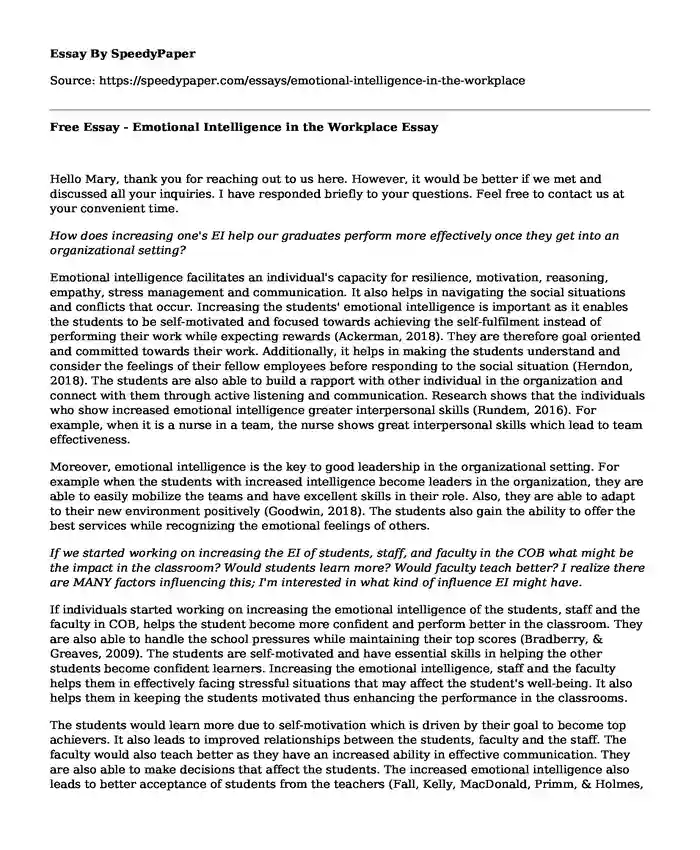
| Type of paper: | Course work |
| Categories: | Students Employment Leadership development Emotional intelligence |
| Pages: | 3 |
| Wordcount: | 735 words |
Hello Mary, thank you for reaching out to us here. However, it would be better if we met and discussed all your inquiries. I have responded briefly to your questions. Feel free to contact us at your convenient time.
How does increasing one's EI help our graduates perform more effectively once they get into an organizational setting?
Emotional intelligence facilitates an individual's capacity for resilience, motivation, reasoning, empathy, stress management and communication. It also helps in navigating the social situations and conflicts that occur. Increasing the students' emotional intelligence is important as it enables the students to be self-motivated and focused towards achieving the self-fulfilment instead of performing their work while expecting rewards (Ackerman, 2018). They are therefore goal oriented and committed towards their work. Additionally, it helps in making the students understand and consider the feelings of their fellow employees before responding to the social situation (Herndon, 2018). The students are also able to build a rapport with other individual in the organization and connect with them through active listening and communication. Research shows that the individuals who show increased emotional intelligence greater interpersonal skills (Rundem, 2016). For example, when it is a nurse in a team, the nurse shows great interpersonal skills which lead to team effectiveness.
Moreover, emotional intelligence is the key to good leadership in the organizational setting. For example when the students with increased intelligence become leaders in the organization, they are able to easily mobilize the teams and have excellent skills in their role. Also, they are able to adapt to their new environment positively (Goodwin, 2018). The students also gain the ability to offer the best services while recognizing the emotional feelings of others.
If we started working on increasing the EI of students, staff, and faculty in the COB what might be the impact in the classroom? Would students learn more? Would faculty teach better? I realize there are MANY factors influencing this; I'm interested in what kind of influence EI might have.
If individuals started working on increasing the emotional intelligence of the students, staff and the faculty in COB, helps the student become more confident and perform better in the classroom. They are also able to handle the school pressures while maintaining their top scores (Bradberry, & Greaves, 2009). The students are self-motivated and have essential skills in helping the other students become confident learners. Increasing the emotional intelligence, staff and the faculty helps them in effectively facing stressful situations that may affect the student's well-being. It also helps them in keeping the students motivated thus enhancing the performance in the classrooms.
The students would learn more due to self-motivation which is driven by their goal to become top achievers. It also leads to improved relationships between the students, faculty and the staff. The faculty would also teach better as they have an increased ability in effective communication. They are also able to make decisions that affect the students. The increased emotional intelligence also leads to better acceptance of students from the teachers (Fall, Kelly, MacDonald, Primm, & Holmes, 2013). It also helps them in dealing with the new challenges that come with a group of students. The self-awareness of the teacher and the faculty also lead to better teaching methods which lead to an enhanced performance in students.
The factors influencing the enhanced performance in the staff, faculty and the students include self-awareness which helps them in realizing their emotions and controlling them. Self-motivation is another factor that leads to self-setting goals to ensure success (Fall, Kelly, MacDonald, Primm, & Holmes, 2013). Empathy enables individuals to understand the feelings of others while self-regulation helps in being aware of one's emotions and the ability to control them without hurting others.
John Chris,
Administrative assistance,
Management Department,
804-444-1689.
References
Ackerman, C. (2018, May 12). How to improve emotional intelligence in the workplace. PositivePsychology.com. https://positivepsychology.com/emotional-intelligence-workplace/
Bradberry, T., & Greaves, J. (2009). Emotional Intelligence 2.0. TalentSmart.
Fall, L. T., Kelly, S., MacDonald, P., Primm, C., & Holmes, W. (2013). Intercultural communication apprehension and emotional intelligence in higher education: Preparing business students for career success. Business Communication Quarterly, 76(4), 412-426. doi:10.1177/1080569913501861
Goodwin, D. (2018). Lincoln and the art of transformative leadership. Harvard Business Review, 96, 126-134.
Herndon, E. (2018, May 16). Why emotional intelligence matters in your job and in your life. Cornerstone University. Retrieved from https://www.cornerstone.edu/blogs/lifelong-learning-matters/post/why-emotional-intelligence-matters-in-your-job-and-in-your-life
Rundem, J. (2016). Why young bankers, lawyers, and consultants need emotional intelligence. Harvard Business Review Digital Articles, 1-5.
Cite this page
Free Essay - Emotional Intelligence in the Workplace. (2023, Apr 19). Retrieved from https://speedypaper.com/essays/emotional-intelligence-in-the-workplace
Request Removal
If you are the original author of this essay and no longer wish to have it published on the SpeedyPaper website, please click below to request its removal:
- Essay Example: Conversation vs. Speeches
- Consumer Culture Analytic Reflection Essay
- Essay Sample: Dialogue Between a Doctor and a Patient Suspected to Suffer from Grave's Disease
- Essay Example on Climate Change Problems in the Coral Reefs
- Essay Example on Legal Form of Business
- Free Essay Example on Mobile Banking and Financial Institutions
- Paper Example. Immigration Policy for Joe Biden Campaign
Popular categories




